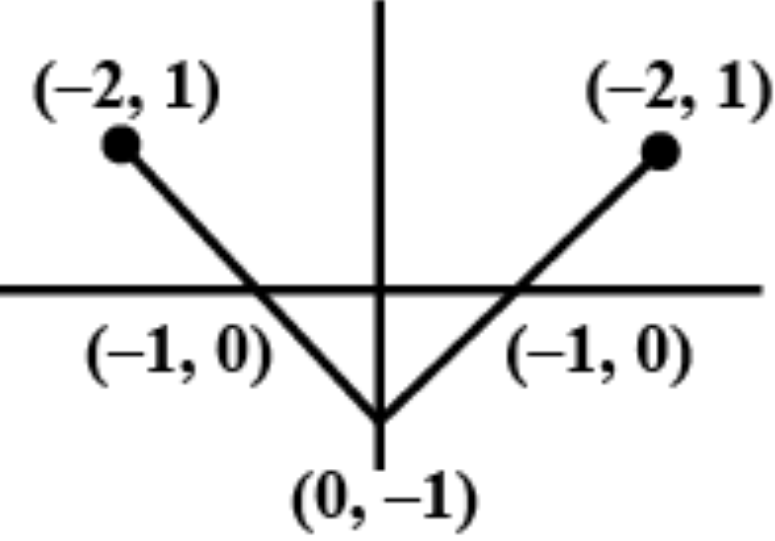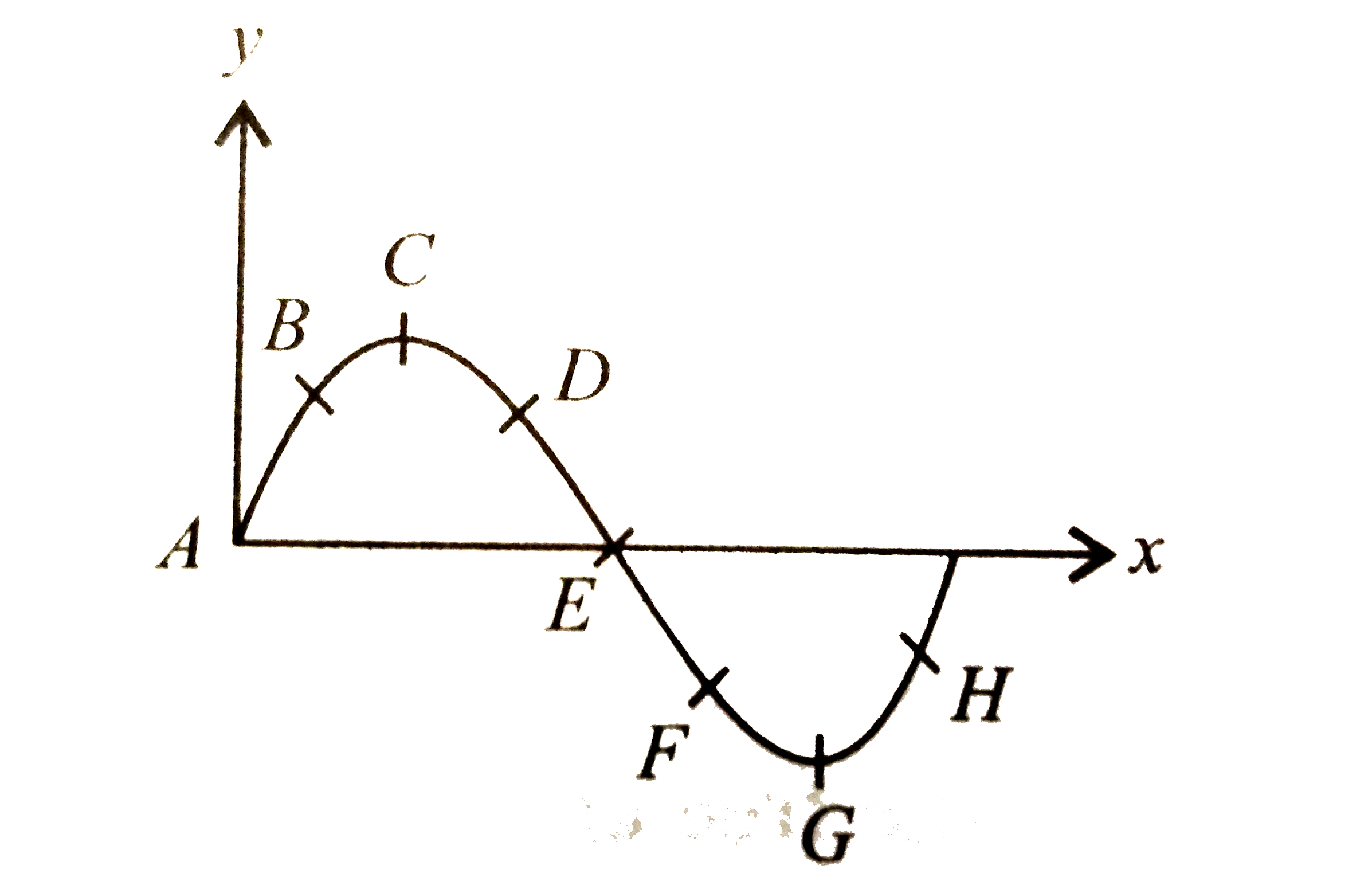Fore a transverse wave on a string, the string displacement is describrd by
y(x,t)=f(x−at)
where f represent a function and a is a negative constant. Then which of the following is//are correct statement(S)?
the shape of the string at time t=0 is given by f(x)
the shape of wave form does not change as it moves along the string
waveform moves in +ve x-direction
the speed of waveform is a
The correct Answer is:a.,b.,d.
To solve the problem, let's analyze the given wave function and the statements one by one.
Given:
The displacement of the transverse wave on a string is described by:
y(x,t)=f(x−at)
where a is a negative constant.
Step 1: Analyze the wave function at t=0
At t=0:
y(x,0)=f(x−a⋅0)=f(x)
This means that the shape of the wave at t=0 is given by the function f(x).
Conclusion: The first statement is correct.
Step 2: Analyze the shape of the wave along the string
The function f(x−at) indicates that the shape of the wave does not change as time progresses. The function f remains the same regardless of the value of t.
Conclusion: The second statement is also correct.
Step 3: Determine the direction of wave travel
The direction of wave travel is determined by the signs of the coefficients of x and t in the argument of the function.
The argument x−at can be rewritten as:
- Coefficient of x: +1 (positive)
- Coefficient of t: −a
Since a is a negative constant, −a becomes positive. Thus:
- Coefficient of t: −a (positive)
Both coefficients are positive, which means the wave travels in the negative direction.
Conclusion: The third statement is incorrect.
Step 4: Calculate the speed of the wave
The speed v of the wave can be calculated using the formula:
v=coefficient of tcoefficient of x
Here:
- Coefficient of t is −a
- Coefficient of x is +1
Thus, the speed of the wave is:
v=−a1=−a
Since a is negative, −a will be positive.
Conclusion: The fourth statement is correct.
Final Summary of Statements:
1. First statement: Correct
2. Second statement: Correct
3. Third statement: Incorrect
4. Fourth statement: Correct
The displacement of the transverse wave on a string is described by:
y(x,t)=f(x−at)
where a is a negative constant.
At t=0:
y(x,0)=f(x−a⋅0)=f(x)
This means that the shape of the wave at t=0 is given by the function f(x).
The function f(x−at) indicates that the shape of the wave does not change as time progresses. The function f remains the same regardless of the value of t.
The direction of wave travel is determined by the signs of the coefficients of x and t in the argument of the function.
- Coefficient of x: +1 (positive)
- Coefficient of t: −a
- Coefficient of t: −a (positive)
The speed v of the wave can be calculated using the formula:
v=coefficient of tcoefficient of x
Here:
- Coefficient of t is −a
- Coefficient of x is +1
v=−a1=−a
Since a is negative, −a will be positive.
1. First statement: Correct
2. Second statement: Correct
3. Third statement: Incorrect
4. Fourth statement: Correct
Topper's Solved these Questions
- TRAVELLING WAVESBOOK - CENGAGE PHYSICS ENGLISHCHAPTER - TRAVELLING WAVESEXERCISE - Assertion-Reasoning
6 Videos
- TRAVELLING WAVESBOOK - CENGAGE PHYSICS ENGLISHCHAPTER - TRAVELLING WAVESEXERCISE - Comprehension
45 Videos
- TRAVELLING WAVESBOOK - CENGAGE PHYSICS ENGLISHCHAPTER - TRAVELLING WAVESEXERCISE - Single Correct Answer
1 Videos
- TRANSMISSION OF HEATBOOK - CENGAGE PHYSICS ENGLISHCHAPTER - TRANSMISSION OF HEATEXERCISE - Single correct
9 Videos
- VECTORSBOOK - CENGAGE PHYSICS ENGLISHCHAPTER - VECTORSEXERCISE - Exercise Multiple Correct
5 Videos
Similar Questions
A tavelling harmonic wave is represented by the equation y(x,t)=10−3 sin (50t+2x), where x and Y are in meter and t is in seconds . Which of the following is a correct statement about the wave?
View SolutionThe graph of the function y=f(x). Then which of the following curve represent the graph of the function y=|f(x)|

View Solution
Knowledge Check
A transverse harmonic wave on a string is described by y(x, t) = 3sin ( 36t + 0.018x + π/4) where x and Y are in cm and t is in s. Which of the following statements is incorrect?
AThe waves is travelling in negative x-directionBThe amplitude of the wave is 3 cmCThe speed of the wave is 20ms−1DThe frequency of the wave is9πHz.The transverse displacement of a string clamped at its both ends is given by
y(x,t)=2sin(2π3x)cos(100πt)
where x and y are in cm and t is in s.
Which of the following statements is correct?AAll the points on the string between two consecutive nodes vibrate with same frequency, phase and amplitude.BAll the points on the string between two consecutive nodes vibrate with same frequency and phase but different amplitude.CAll the points on the string between two consecutive nodes vibrate with different frequency and phase but same amplitude.DAll the points on the string between two consecutive nodes vibrate with different frequency, phase and amplitudeA transverse wave is travelling along a string from left to right. The figure below represents the shape of the string at a given instant. At this instant, among the following, choose the wrong statement.
 APoints D, E, F have upward positive velocity.BPoints A, B and H have downward negative velocityCPoint C and G have zero velocity.DPoints A and E have minimum velocity.
APoints D, E, F have upward positive velocity.BPoints A, B and H have downward negative velocityCPoint C and G have zero velocity.DPoints A and E have minimum velocity.
A transverse wave propagating along x-axis is represented by: y(x,t)=8.0sin(0.5πx−4πt−π4) Where x is in metres and t is in seconds. The speed of the wave is:
View SolutionA wave pulse in a string is described by the equation y1=5(3x−4t)2+2 and another wave pulse in the same string is described by .. The values of y2=−5(3x+4t−6)2+2 and x are in metres and t is in seconds. Which of the following statements is correct ?
View SolutionThe transverse displamcement y(x,t) of a wave y(x,t ) on a string is given by yox, t) = . This represents a
View SolutionA transverse wave travelling on a stretched string is is represented by the equation
y=2(2x−6.2t)2+20. Then ,
View SolutionIf in the quadratic function f(x)=ax2+bx+c, a and c are both negative constant, which of the following could be the graph of function f?
View Solution
